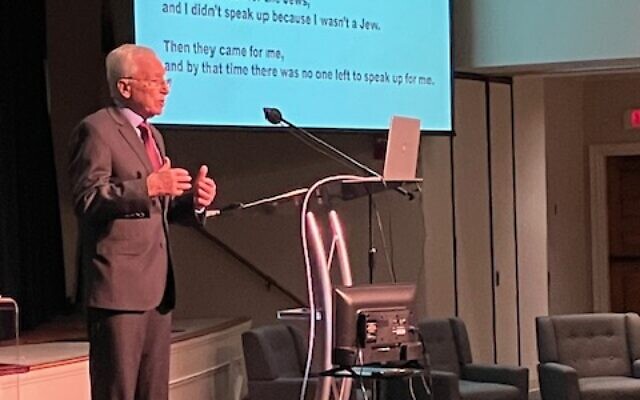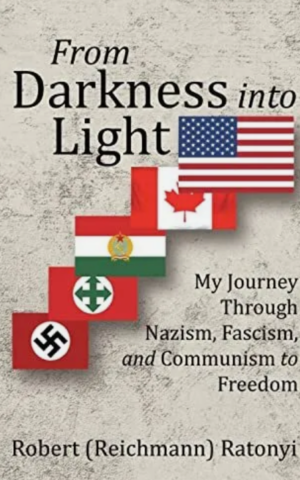Dunwoody Church is Site for Holocaust Remembrance
The Atlanta World War II History Roundtable hosts Holocaust survivor Robert Retonyi at Dunwoody United Methodist Church.

A near capacity audience crowded into the spacious social hall of the Dunwoody United Methodist Church, just north of the Perimeter, last month to commemorate International Holocaust Remembrance Day.
The event at the church, which was sponsored by the Atlanta World War II History Roundtable, featured an hour-long multimedia presentation by Robert Ratonyi, who was only 6 years old when the Nazis began their destruction of the Hungarian Jewish community in the last full year of World War II, late in 1944.
Ratonyi has been a frequent speaker at the Breman Jewish Heritage Museum and at various programs around the state, sponsored by the Georgia Commission on the Holocaust. His book, “From Darkness Into Light,” is a 343-page personal memoir of growing up, first, during the Nazi invasion late in the war, and then during the Communist takeover of Hungary after the war. Later, as a young college student, he participated in the Hungarian uprising of 1956 and had to flee the country. His book is particularly about his memories of those dozen years that led him, as his book’s title suggests, to a new appreciation of freedom.

After carefully leading his audience through the horrors he endured as a child he reminded them of how it was not just Germans who hunted down and killed Jews, but it was their Hungarian allies, the Fascist soldiers of the Arrow Cross army, who were at least as brutal and murderously antisemitic as their Nazi allies. He reminded the audience just how bloodthirsty and vicious these troops had been when he showed a film clip of how Jews were led to the edge of the Danube River bound, together by rope or in iron manacles, so they couldn’t escape and shot one by one on the riverbank.
It is those deep-seated urges that were expressed to commit evil so cruelly that day that, according to Ratonyi, we must guard ourselves against.
He urged his listeners, at the church, to look deep into our hearts and ask themselves a simple but profound question: “What causes people to cross that thin line between good and evil? The famous philosopher George Santayana once said, ‘those who cannot remember the past are condemned to repeat it.’ That’s why I told my story to you and thousands of students and adults.”
He went on to describe the murder and violence he had seen as a child to the events of the recent past that occurred in Southern Israel.
“Human nature has not changed for the better for hundreds of thousands of years and it is not likely to change in the future. There will never be a medical cure or a vaccine against genocide. I have concluded that without strictly enforced laws, the drive for power, whether by a dictator or a politician in a democracy, leads to the corruption and the killing of innocent people.”
While the crowd sat in attentive silence, most were older, many with graying hair. It caused Jeffrey Johnson, the president of the World War II Roundtable, to wonder why there were so few young people there. High school and college students were invited to participate, and even a number of history teachers in the public schools were urged to come. Few did, Johnson lamented.

He cited a poll taken by The Economist magazine and the YouGov website that found that one in five American between the ages of 18 and 29 believe the Holocaust is a myth and about 30 percent neither agree nor disagree that the Holocaust happened. In an interview following the event Johnson expressed his disappointment that there were so few young people in the audience to hear Robert Ratonyi.
“We had really promoted this to be an event for young people,” Johnson said, “because it’s really addressing the rise of antisemitism and Holocaust denial among America’s youth. There was one lady who brought her five kids, and I saw some others, but overall, there was a lot of gray hair that was at that meeting. And for me, it’s disappointing, but it provides clarity, and I would rather have clarity, even if that clarity does not fit the way I would like things to be.”



comments